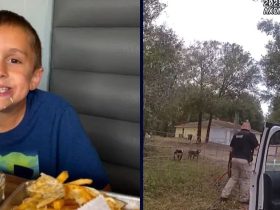Marquis McKenzie is aware of how terrible prison life can be. His path started when he made a single bad choice and was charged with armed robbery as an adult at the age of 15.
“We saw a random person get out of a car, and I decided to approach that individual,” McKenzie remembered. “I held him at gunpoint, took some of their belongings, and ran off.”
McKenzie was unaware that the event had been captured on camera. Police found him and took him into custody in a matter of minutes.
“I thought I’d be released after 21 days, like most juveniles,” he stated. “But on March 21, I was direct-filed. I didn’t even know what direct file was.”
The state attorney alone has the authority to charge a minor as an adult, a procedure called as “direct file.” Alisha Adamson Profit, a criminal defense lawyer, described the process.
“Once a juvenile is charged as an adult, everything transfers,” Profit stated. “They’re no longer held in the Department of Juvenile Justice. They go to the adult jail. The State Attorney’s Office considers their past criminal history and the severity of the current charge.”
This resulted in McKenzie receiving a sentence of six years in adult prison. In the present day, McKenzie is a prosperous businesswoman.
He gained expertise while incarcerated as the “house man,” who was in charge of keeping his dorm tidy. An idea came to him after his dorm won cleaning contests time and time again.
Cleaning outside won’t be as difficult if I’m doing this for free here, McKenzie reasoned. McKenzie started a cleaning company using startup money from his girlfriend’s (now his wife) tax refund.
“I bought cleaning supplies and spent most of my money on marketing,” he stated.
McKenzie began cleaning houses before landing jobs cleaning corporate complexes. He now makes six figures while juggling his business and his efforts to restore rights for people who have served time in prison.
McKenzie’s tale is unique. Many young people who are charged as adults find it difficult to start over. Jim West, a mental health psychotherapist, contends that treating kids like adults is simply not the solution.
According to West, “kids emotions escalate quickly. They have no mood regulation. They’re just passionately [expletive] or passionately excited.”
West stresses the need to acknowledge the developmental distinctions between juveniles and adults even as he promotes accountability.
“These kids should not have access to guns, I mean they just can’t handle it, they will do stupid things like this. There are personal fables they tell themselves where they think nothing is going to happen to them and that they are invincible,” West stated. “Adults just have more resources, he continued.
Read Also: Connecticut’s Nursing Home Crisis: Rising Closures Leave Seniors Vulnerable
By mentoring at-risk adolescents and advocating for firearms education, McKenzie is now committed to preventing violent juvenile crime.
“If I’d known the purpose of a gun, how to clean it, and why to use it responsibly, I would’ve never gone out with one,” McKenzie stated. “Because of my actions, I lost my gun rights for life. No one in my household can legally own a firearm.”












Leave a Reply